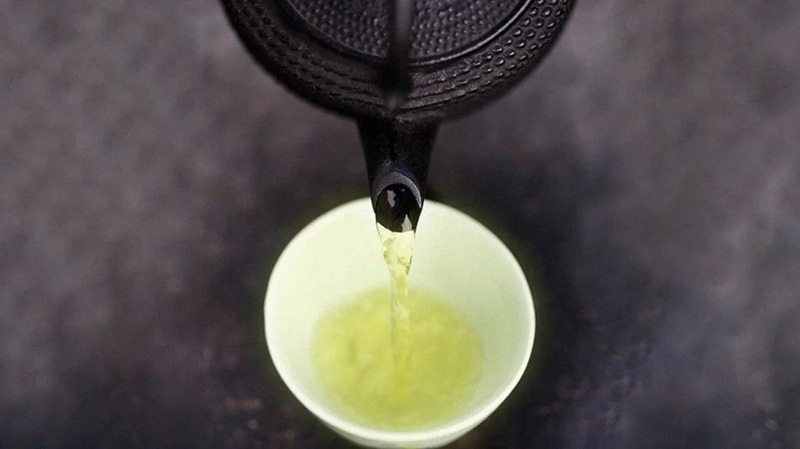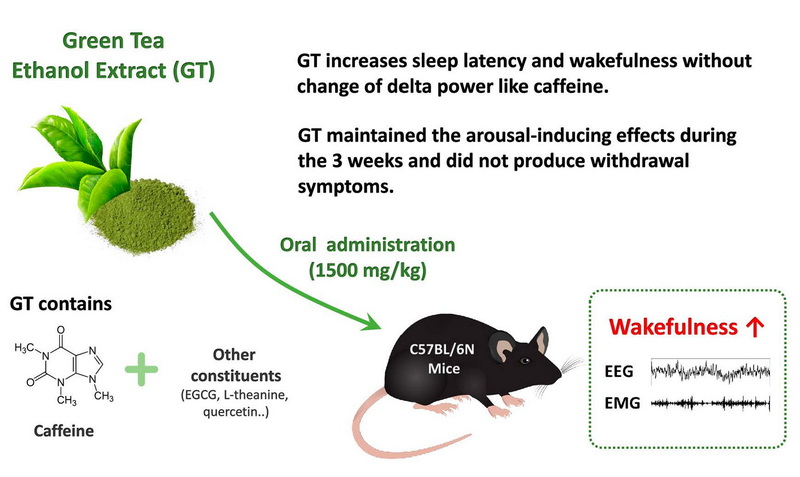Content Menu
● Understanding Green Tea Extract
● The Components of Green Tea and Their Effects
>> Caffeine
>> L-Theanine
>> Catechins
● How Green Tea Extract May Help Sleep
● Research Findings
● Best Practices for Consuming Green Tea for Sleep
● The Role of Lifestyle Factors
● Conclusion
● FAQ
>> 1. Can I drink green tea before bed?
>> 2. How much green tea should I drink for better sleep?
>> 3. Does all green tea help with sleep?
>> 4. Can green tea cause insomnia?
>> 5. Are there any side effects from drinking too much green tea?
● Citations:
Green tea has been a staple in many cultures for centuries, revered not only for its refreshing taste but also for its numerous health benefits. Among these benefits, its potential effects on sleep have garnered significant interest. This article explores the relationship between green tea extract and sleep, examining the science behind its components and their effects on sleep quality.

Understanding Green Tea Extract
Green tea extract is derived from the leaves of the *Camellia sinensis* plant and is rich in antioxidants, particularly catechins like epigallocatechin gallate (EGCG). These compounds are believed to contribute to various health benefits, including improved brain function, weight management, and enhanced mood. However, the focus here is on how these components may influence sleep.
The Components of Green Tea and Their Effects
Caffeine
One of the most well-known components of green tea is caffeine. While caffeine is known for its stimulating effects, it can also disrupt sleep if consumed in large quantities or too close to bedtime. A typical cup of green tea contains about 30-50 mg of caffeine, which is significantly less than coffee but still enough to affect sensitive individuals.
The timing of caffeine consumption is crucial; consuming it in the afternoon or evening can lead to difficulties falling asleep or staying asleep throughout the night. For those who are particularly sensitive to caffeine, it may be beneficial to limit intake or choose decaffeinated options.
L-Theanine
L-theanine is an amino acid found in green tea that promotes relaxation without sedation. Research suggests that L-theanine can help reduce stress and anxiety levels, potentially leading to improved sleep quality. It works by increasing levels of GABA, dopamine, and serotonin—neurotransmitters that regulate mood and relaxation.
Studies have shown that L-theanine can help individuals fall asleep faster and experience deeper sleep cycles. This effect makes green tea a unique beverage that can provide both alertness during the day and relaxation at night when consumed appropriately.
Catechins
Catechins, particularly EGCG, have been shown to have various health benefits, including anti-inflammatory properties and potential neuroprotective effects. Some studies suggest that these antioxidants can help improve cognitive function and reduce stress levels, both of which can indirectly contribute to better sleep.
Moreover, catechins may play a role in regulating blood sugar levels and reducing anxiety, further supporting a healthy sleep environment. By managing these physiological factors, green tea extract can create conditions more conducive to restful sleep.
How Green Tea Extract May Help Sleep
1. Promotes Relaxation: The calming effects of L-theanine can help prepare the mind for sleep by reducing anxiety and promoting relaxation.
2. Reduces Stress: By lowering stress hormones such as cortisol, green tea extract may help create a more conducive environment for restful sleep.
3. Improves Sleep Quality: Some studies indicate that regular consumption of green tea may enhance sleep quality by promoting deeper sleep stages.
4. Potentially Increases Sleep Duration: While more research is needed, some evidence suggests that green tea extract could help increase total sleep time.
5. May Counteract Caffeine's Effects: The presence of L-theanine may mitigate some of the stimulating effects of caffeine, making it easier to fall asleep after consuming green tea.
6. Supports Healthy Circadian Rhythms: Some research indicates that antioxidants found in green tea may play a role in regulating circadian rhythms, which are essential for maintaining a healthy sleep-wake cycle.
Research Findings
Numerous studies have explored the relationship between green tea consumption and sleep quality:
- A study published in *Healthline* found that drinking green tea throughout the day could reduce fatigue and improve sleep quality due to its L-theanine content.
- Another study indicated that low-caffeine green tea could significantly improve sleep quality among older adults by suppressing stress responses.
- Research involving matcha green tea showed improvements in emotional perception and sleep quality among older adults with mild cognitive decline.
- A 2020 study published in *Nutrients* highlighted that regular consumption of green tea was associated with better self-reported sleep quality among older adults. Participants who consumed green tea reported fewer instances of insomnia compared to those who did not consume it regularly.
- Additionally, a randomized controlled trial showed that participants who took L-theanine supplements experienced significant improvements in sleep efficiency and overall sleep satisfaction compared to those who received a placebo.

Best Practices for Consuming Green Tea for Sleep
To maximize the potential sleep benefits of green tea while minimizing any adverse effects from caffeine:
- Choose Low-Caffeine Options: Opt for decaffeinated or low-caffeine varieties if you are sensitive to caffeine or plan to drink it close to bedtime.
- Timing Matters: Consume green tea earlier in the day rather than right before bed to avoid potential disruptions in your sleep cycle.
- Moderate Consumption: Aim for 1-3 cups per day to enjoy its benefits without overdoing caffeine intake.
- Explore Different Types: Different varieties of green tea contain varying levels of catechins and L-theanine. Matcha, for example, is particularly high in L-theanine due to its unique growing process where the leaves are shaded before harvest.
The Role of Lifestyle Factors
While green tea extract can contribute positively to sleep quality, it's essential to consider other lifestyle factors that impact sleep:
- Sleep Hygiene: Establishing a regular bedtime routine can signal your body when it's time to wind down. This includes dimming lights, reducing screen time before bed, and creating a comfortable sleeping environment.
- Dietary Choices: A balanced diet rich in whole foods can support overall health and well-being. Foods high in magnesium (such as nuts and seeds) and tryptophan (found in turkey) can promote better sleep.
- Physical Activity: Regular exercise has been shown to improve sleep quality; however, it's best not to engage in vigorous workouts close to bedtime as this may have an energizing effect.
- Mindfulness Practices: Incorporating mindfulness techniques such as meditation or deep-breathing exercises into your daily routine can help reduce stress levels and promote relaxation before bed.
Conclusion
Green tea extract may offer several benefits that contribute positively to sleep quality through its unique combination of L-theanine, catechins, and moderate caffeine content. While it can promote relaxation and reduce stress levels, it's essential to consider individual tolerance to caffeine when incorporating it into your evening routine.
By understanding how different components work together within green tea extract, individuals can make informed choices about their consumption habits—ultimately leading to improved sleep outcomes. As always, it's advisable to consult with a healthcare professional before making significant changes to dietary habits or supplement routines.

FAQ
1. Can I drink green tea before bed?
Yes, but it's best to choose a low-caffeine or decaffeinated option if you are sensitive to caffeine.
2. How much green tea should I drink for better sleep?
1-3 cups a day can provide benefits without excessive caffeine intake.
3. Does all green tea help with sleep?
Not all types are equal; look for those high in L-theanine and low in caffeine for better results.
4. Can green tea cause insomnia?
In sensitive individuals or when consumed too close to bedtime, yes; moderation is key.
5. Are there any side effects from drinking too much green tea?
Excessive consumption can lead to side effects such as insomnia or digestive issues due to high caffeine or catechin content.
Citations:
[1] https://teacultureoftheworld.com/blogs/all/unwind-after-a-long-day-benefits-of-drinking-green-tea-at-night
[2] https://www.healthline.com/nutrition/green-tea-before-bed
[3] https://journals.plos.org/plosone/article?id=10.1371%2Fjournal.pone.0309287
[4] https://pmc.ncbi.nlm.nih.gov/articles/PMC5537891/
[5] https://www.healthline.com/nutrition/10-benefits-of-green-tea-extract
[6] https://www.youtube.com/watch?v=t4Gcrc9lMog
[7] https://pmc.ncbi.nlm.nih.gov/articles/PMC5703787/
[8] https://pmc.ncbi.nlm.nih.gov/articles/PMC9967785/
[9] https://www.medicalnewstoday.com/articles/269538
[10] https://www.youtube.com/watch?v=otxM65Fy_Ec
[11] https://www.nature.com/articles/d42473-023-00394-0
[12] https://www.mdpi.com/2072-6643/15/4/1042
[13] https://pmc.ncbi.nlm.nih.gov/articles/PMC8601997/
[14] https://www.mdpi.com/2304-8158/11/23/3930
[15] https://www.healthline.com/nutrition/10-benefits-of-green-tea-extract
[16] https://www.sleepfoundation.org/sleep-aids/l-theanine-for-sleep
[17] https://www.nutraingredients.com/Article/2004/03/17/Green-tea-lulls-brain-into-quality-sleep/
[18] https://www.innisfree.com/my/en/product/productView.do?prdSeq=28027
[19] https://www.youtube.com/watch?v=vwSZrxarkqE
[20] https://www.youtube.com/watch?v=LGmsOM5X66Y
[21] https://www.youtube.com/watch?v=Rsvq2JMCquU
[22] https://www.researchgate.net/figure/Effects-of-caffeine-30-mg-and-theanine-50-mg-mixtures-on-the-objective-sleep-quality_fig5_372417881
[23] https://www.youtube.com/watch?v=eE1WOyMFERg
[24] https://alz-journals.onlinelibrary.wiley.com/doi/abs/10.1002/alz.069150






























